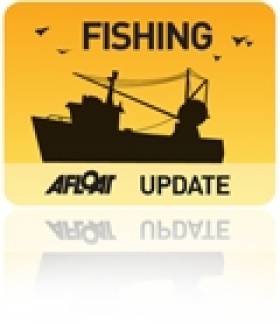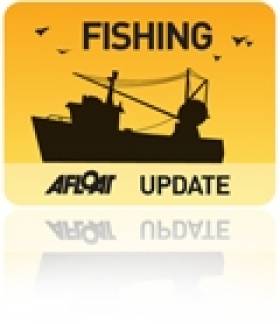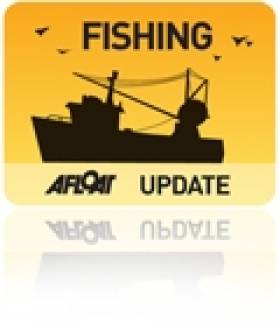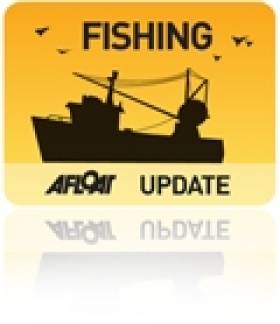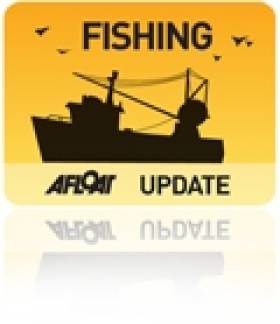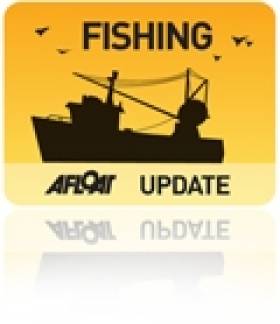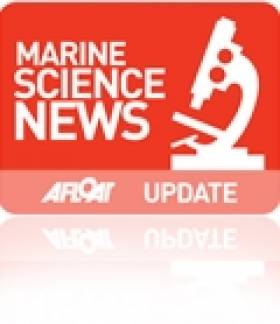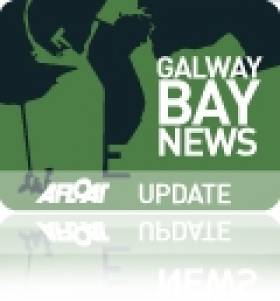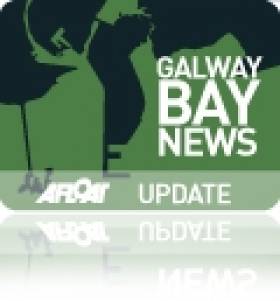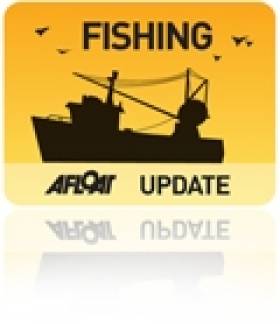Displaying items by tag: fish farm
BIM Won't Divulge Galway Bay Fish Farm Interested Parties
#FishFarm - Bord Iascaigh Mhara is keeping mum when it comes to naming who's expressed an interest in operating the controversial Galway Bay fish farm, according to the Connacht Tribune.
The fisheries board would only confirm than 21 investors and businesses have come forward with a view to running or funding the 500-hectare organic salmon farm off the Aran Islands, which would be the largest of its kind in Europe.
And that's raised the ire of Galway Bay Against Salmon Cages, one of the community groups opposed to the scheme, whose chairman Billy Smyth said: "They need to come clean and tell us who the 21 companies are."
He added: "This project would cost €70 million just to get started and there are very few salmon farm companies that would be in a position to finance that sort of capital investment."
As reported last month on Afloat.ie, Marine Minister Simon Coveney said a decision would be coming soon on whether he will give the go-ahead for the project.
The Connacht Tribune has more on the story HERE.
Galway Bay Fish Farm Decision Coming 'Soon' Says Minister
#FishFarm - Marine Minister Simon Coveney will make a decision on the controversial Galway Bay fish farm "as soon as possible", as The Irish Times reports.
Bord Iascaigh Mhara's ambitious proposal off the Aran Islands for a 500-hectare organic salmon farm – which would be the largest of its kind in Europe – was pushed back over a year ago amid protests from angling and community groups opposed to the scheme, and concerns from the EU over its environmental impact.
It is now one of a whopping 600 applications for aquaculture licences of various scopes under consideration by the minister.
Many of these are said to have been in the system for more than five years – costing the State some €60 million in investment opportunities, as the Irish Farmers' Association claims.
Discussing his department's plans for aquaculture in replies to Dáil questions this week, Minister Coveney maintained there is a "strict separation" between his role as "decision maker" and his duty to promote development in the industry.
The Irish Times has more on the story HERE.
Fish Farm Pesticides Pose Threat To Shellfish Industry Say Researchers
#Fishing - The unregulated use of pesticides by fish farms poses a significant threat to both the shellfish industry and marine wildlife, according to new research findings.
The Irish Examiner reports on the study by the Norwegian Institute for Water Research, which confirms that pesticides used to kill sea lice infestations in aquaculture schemes often exceed environmental quality standards, or EQS.
Researchers studies samples from fish farms in Norway, which has no EQS system, and compared them to thresholds in the UK.
The study has been welcomed by lobby group Save Bantry Bay, whose secretary Alect O'Donovan claimed the value of shellfish to the local economy was more than €640,000 in 2009.
"It is ludicrous to put this at risk by adding more salmon farms and greater pesticide emissions that have the potential to wipe out stocks," he added.
Management of Ireland's shellfish fisheries and wildlife in general will be up for discussion at this year's Buckland Lecture in UCD next Wednesday evening (29 October), as Derek Evans writes in The Irish Times.
Malcolm Windsor, formerly of the North Atlantic Salmon Conservation Organisation, will be joined by Frank Convery, Ken Whelan and a panel of experts on the night to debate these important issues.
Galway TD Says Aran Islands Fish Farm Plans Carry 'Too Many Risks'
#FishFarm - Galway West TD Derek Nolan has joined calls for refusal of a State licence for the proposed Galway Bay salmon farm, as The Irish Times reports.
The 500-hectare scheme near the Aran Islands – which would make it the largest such aquaculture project in Europe – has faced opposition from conservationists and anglers since long before Brussels halted the plans late last year amid concerns over environmental impact studies relating to the scheme.
The European Commission has now closed its investigation, with Bord Iasaigh Mhara (BIM) – which initiated the project and has since made plans for a second scheme – saying that this meant the State had "no case to answer", giving the green light for licensing to proceed.
But now Labour TD Nolan has spoken out after "new information coming to light this year showed that hundreds of thousands of farmed salmon escaped from a farm in Bantry Bay and were unaccounted for."
Underlining his opinion that the project "carries too many risks", his statement added: "I feel there is now too much evidence showing the negative impact this salmon farm could have on Galway Bay."
The Irish Times has much more on the story HERE.
#FishFarm - Undercurrent News reports that Friends of the Irish Environment (FIE) is seeking a High Court injunction against Marine Harvest Ireland over an unauthorised pipeline used to extract water from a freshwater lough to treat salmon at its farm on the Galway coast.
As previously reported on Afloat.ie, the operators of the salmon farm at Kilkiernan Bay installed a pipeline more than 3km long connected to nearby Loughaunore in order to treat an outbreak of amoebic gill disease.
But Galway County Council had not yet made any decision on permitting the pipeline, which was proposed for exemption from standard planning requirements.
The council has since ruled that the development was unauthorised and did require planning permission.
Yet the pipeline remains in place - prompting FIE to seek an injunction against the Irish branch of the Norwegian seafood giant under Section 160 of the Planning and Development Act. More on the story HERE.
Meanwhile, Marine Harvest has been identified as the "most likely" foreign investor to be attracted by the controversial fish farm proposals for Galway Bay and elsewhere, as Victoria White writes in the Irish Examiner.
The columnist visited Inishbofin in Co Galway and Inishturk in Co Mayo, close to the latest proposed location for massive farmed salmon operations, to get the local perspective, and found some vociferous arguments against the shape of BIM's plans - particularly the damaging effects of large-scale monoculture as opposed to smaller but widespread sustainable schemes.
Delays In Fish Farm Licensing Costing The State Big Say IFA
#Fishing - Are Scotland's tiny Orkney Islands producing more farmed salmon than the whole of Ireland?
That's what the Irish Farmers' Association (IFA) claims in its latest report submitted to Marine Minister Simon Coveney.
According to The Irish Times, the new report also claims that delays in issuing new fish farming licences have cost the State some €60 million in investment opportunities.
The report's figures say around 600 licence applications have been in the system, some for as long as seven years.
IFA president Eddie Downey is calling for a "radical streamlining" of the "bureaucratic bottlenecks" currently stunting the growth of important aquaculture centres in on the west coast from Donegal to Cork, where the IFA contends the local industry has "carved a nice at the high end of the organic market" independent of Government actions.
The Irish Times has much more on the story HERE.
Marine Institute Stands Over Salmon Study
#FishFarm - The Marine Institute says it stands over the "quality and accuracy" of its research into the environmental impact of the proposed Galway Bay fish farm as the journal behind an alternative report acknowledged it had erred in its publication.
Last August the institute spoke out over "inaccuracies" in a news story citing a paper in the Journal of Fish Diseases, which was described as identifying "fundamental errors" in the Marine Institute's (MI) research on the potential impact of salmon farming on wild salmon numbers in the region.
The MI-sponsored study was submitted to Brussels by the Department of the Marine to support the case for Bord Iascaigh Mhara's (BIM) 500-hectare organic salmon farm planned off Inis Oírr in the Aran Islands.
This was despite concerns expressed last summer by Inland Fisheries Ireland that the research was based on flawed methodology.
However, the Journal of Fish Diseases has since issued an apology for presenting its report on the Marine Institute's research as having been peer reviewed. It has since been reclassified as 'comment', and the journal has published a rebuttal by the Marine Institute.
In a statement this week, Marine Institute chief Dr Peter Heffernan defended the science behind its research, saying: "The methodology and statistical analyses used in the original Marine Institute paper is the accepted scientific approach, allowing for robust findings."
He also claimed that the comment piece criticising the MI's research "was based on an analysis of just 56 summary data points as opposed to over 352,000 individual data points used in the Marine Institute analysis."
Dr Heffernan added: "As the national agency responsible for marine research, we stand firmly over our science."
The Marine Institute's statement comes as the fish farm controversy returns to the news agenda, with the Irish Examiner reporting on the European Commission's ongoing investigation of conflicting scientific studies related to the scheme, after Brussels called a halt to BIM's plans last November.
As previously reported on Afloat.ie, it will be at least six months before any decision is made by Government on the Galway Bay fish farm proposals.
Six More Months Before Any Decision On Galway Bay Fish Farm
#FishFarm - Any decision on the proposed deep-sea organic salmon farm for Galway Bay is at least six months off, as Galway Bay FM reports.
That was the message from the Department of the Marine after Galway TD Eamon O'Cuiv raised the matter in the Dáil this week.
Previously the Fianna Fáil deputy for Galway West had called on Bord Iascaigh Mhara (BIM) to withdraw its application for the 500-hectare fish farm off Inis Oírr in the Aran Islands in light of dispute over the potential impact of sea lice on the region's wild salmon stocks.
His call, in turn, came after the European Commission halted progress on BIM's plans last November amid concerns regarding scientific studies on the impact of disease at what would be the largest aquaculture scheme of its kind in Europe.
Galway TD Wants Withdrawal Of Aran Islands Fish Farm Application
#FishFarm - Fianna Fáil TD Eamon O'Cuiv has called on Bord Iascaigh Mhara to withdraw the application for its proposed 500-hectare organic salmon farm in Galway Bay.
As Galway Bay FM reports, the Galway West deputy argues that the licence should not be sought until after discussion with the Marine Institute and Inland Fisheries Ireland over the potential impact of sea lice on wild salmon stocks in the region.
Last month Afloat.ie reported that plans for what would be the largest aquaculture scheme of its kind in Europe - located off the Aran Islands - were halted by the European Commission admix concerns over scientific studies on the impact of disease via intensive salmon farming.
The EU's Environment Minister gave Ireland's Marine Minister till 15 January 2014 to provide explanations in a number of key areas after he reopened the pilot investigation into the fish farm proposals.
Galway Bay Fish Farm Plans Halted By Europe
#FishFarm - Plans for what would be Europe's largest organic salmon farm located off the Aran Islands have been halted by the European Commission amid worries over scientific studies related to the impact of disease.
The Galway Advertiser reports that EU Environment Commissioner Janez Potocnik has reopened the pilot investigation into the Galway Bay fish farm proposals, and has given Marine Minister Simon Coveney till 15 January 2014 to provide explanations over a number of key concerns.
Pilot Investigation 764/09/ENV1 is looking into claims of errors in the analysis of key papers regarding the threat posed to wild salmon by sea lice in intensive salmon farming.
Meanwhile, the investigation is also following allegations that the Department of the Marine withheld information from State fisheries body Inland Fisheries Ireland (IFI) on the scale of damage caused to wild fish from lice - and that Minister Coveney refused to answer Dáil questions on the controversial matter.
The decision to halt plans for the 500-hectare fish farm has been welcomed by local campaigners against the scheme such as the Galway Bay Protection Group, which has called for a public enquiry on the proposals.
The Galway Advertiser has much more on the story HERE.


























